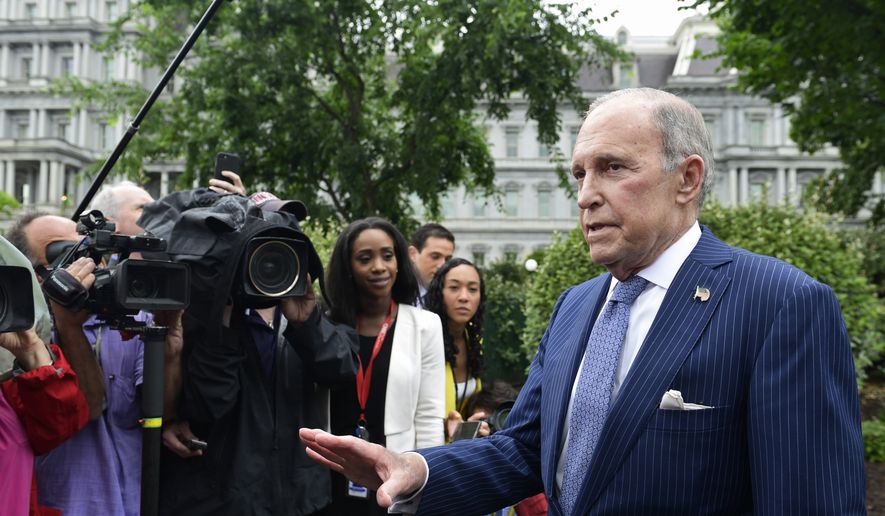Canada’s top trade negotiators rushed to Washington on Tuesday to try to join the U.S.-Mexico deal to replace NAFTA, as the Trump administration upped the pressure on them with a Friday deadline for an agreement.
President Trump said he will scrap the three-way North American Free Trade Agreement now that he has reached a tentative deal with Mexico, putting Canada on the spot to make a deal or get left out.
Canadian Prime Minister Justin Trudeau, who previously clashed with Mr. Trump, found his liberal government under pressure to accept new “Made in America” requirements for manufacturing automobiles and other rules in the U.S.-Mexico deal.
Raising the stakes, Mr. Trump threatened to hit Canada with a 25 percent tariff on vehicles if the two countries can’t make a deal.
Larry Kudlow, the president’s chief economic adviser, said Mr. Trump would love to make a mutually beneficial trade deal with Canada but would not back down.
“I think people must take him seriously. He’s proven time and time again that in his quiver of weapons on free trade, he will use tariffs if he believes that’s necessary,” he said on Fox Business Networks’ “Varney & Co.”
Canada stayed on the sidelines while the U.S. and Mexico did the hard bargaining to rewrite the 24-year-old NAFTA. But the tentative deal announced Monday lit a fire under Mr. Trudeau’s government.
Canadian Foreign Affairs Minister Chrystia Freeland, who is leading the NAFTA talks for her country, cut a trip to Europe short and jetted to Washington.
She was joined by Mr. Trudeau’s negotiating team for face-to-face deal making with U.S. Trade Representative Robert E. Lighthizer and Mexican Secretary of Economy Ildelfonso Guajardo.
The tentative deal seeks to end the exodus of manufacturing from the U.S., especially automakers.
It would raise the minimum level of North American components in an automobile to qualify for tariff-free treatment under NAFTA from 62.5 percent to 75 percent.
The agreement also would boost wages for Mexican workers, keep agricultural products tariff-free, increase environmental standards in Mexico and overhaul rules for online commerce.
The agreement would last 16 years, with an opportunity to review it and adjust the terms after six years.
Mr. Trump had wanted the “Made in America” provision for autos to be increased to 85 percent and the NAFTA replacement to sunset after five years.
Treasury Secretary Steven T. Mnuchin said he hoped to see a deal with Canada by the end of the week.
“The U.S. market and the Canadian markets are very intertwined,” Mr. Mnuchin said on CNBC. “It’s important for them to get this deal and it’s important for us to get this deal.”
Mr. Trump plans to submit a deal to Congress on Friday with or without Canada, Mr. Lighthizer said.
Ripping up NAFTA was a central campaign promise for Mr. Trump, who decried the 1994 agreement as “the worst deal ever made” and blamed it for the demise of U.S. manufacturing.
Negotiations for a NAFTA rewrite dragged on for a year before the breakthrough Monday. The U.S. and Mexico intensified the effort to get a deal signed before the Dec. 1 inauguration of Mexican President-elect Andres Manuel Lopez Obrador, a far-left politician who some fear will scuttle a deal.
Congressional approval of the agreement, which requires a 90-day waiting period, will delay the signing of the deal until Nov. 30.
Mr. Trump faces pressure from Democrats and his own Republicans to include Canada in a new three-way deal.
Without Canada, the agreement could exceed fast-track negotiating authority Congress granted the president for NAFTA. That would trigger a much tougher 60-vote threshold in the Senate to ratify a U.S.-Mexico deal.
Senate Minority Leader Charles E. Schumer questioned whether the U.S.-Mexico deal would even live up to the hype.
“I’m a little worried this one’s like North Korea. You know, they have a nice announcement, but then we don’t see the details and who knows what we’ll see afterwards,” the New York Democrat said. “So we’re in a period of watchful waiting. Let’s see the details.”
• S.A. Miller can be reached at smiller@washingtontimes.com.




Please read our comment policy before commenting.